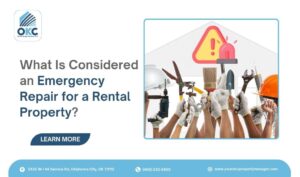When it comes to renting out property, a home inspection is a critical step in ensuring its value and safety. Without understanding the mandatory fixes after a home inspection can be challenging to navigate the landlord repair responsibilities.
Thus, a thorough rental inspection is mandatory to reveal critical issues that affect safety and habitability. It will help to address those critical issues such as heating, plumbing, and structural integrity. These essential fixes protect your investment and keep you on the right side of the law.
This guide will help you understand the necessary steps to ensure your rental property meets local housing standards, keeps tenants safe, and avoids legal complications. Let’s delve into the essential repairs every landlord should consider after an inspection.
Who Verifies Issues on Home Inspection?
The licensed home inspector thoroughly inspects the property. They document every issue, defect, or concern present to make a detailed report. Thus, the verification issues raised in a home inspection, including any requested repairs, are tackled by a landlord or property manager through the following steps:
- Inspection Report Review: The landlord or property manager reviews the inspection report that the home inspector provides.
- Assessment of Issues: Based on the inspection report, the landlord or property manager assesses the severity of any identified issues or repairs that need to be addressed. Considering property investment? Similarly, an inspection report can help you assess the issues, for more insights, refer to our article on when to walk away after a home inspection.
- Deciding on Repairs: The landlord decides which repairs, if any, they are willing to undertake before renting out the property. This decision may depend on the seriousness of the issues and local landlord-tenant laws.
- Repair Completion: If the repair of the issue is decided or agreed upon by the landlord, they will arrange for contractors or maintenance personnel to complete the necessary work.
- Verification of Repairs: Once repairs are completed, the landlord or property manager verifies that the repairs have been done satisfactorily. This may involve conducting their own inspection or hiring a third-party inspector to ensure the work meets acceptable standards.
- Disclosure to Tenant: The landlord discloses the inspection results and any repairs made to the potential tenant. This transparency helps set expectations and ensures both parties know the property’s condition before finalizing the rental agreement.
- Documentation: The landlord needs to keep documentation of the inspection report, any repairs made, and the verification process. This documentation can be crucial in case of any disputes or issues that may arise later.
What Fixes Are Mandatory for Landlords to Make?
The fixes that are mandatory for landlords to make depend largely on local laws, regulations, and the terms outlined in the lease agreement. However, landlords must fulfill generally recognized obligations regarding repairs and maintenance to ensure the property is safe and habitable for tenants. Here are some common examples:
- Essential Services: Landlords are generally required to repair essential services such as heating, electricity, and plumbing and ensure they work properly.
- Structural Issues: Landlords are required to repair and maintain structural issues such as walls, roofs, floors, and foundations for better inhabitants. For Example, landlords need to repair missing shingles promptly to prevent roofing damage and ensure the property remains weatherproof.
- Safety Hazards: Landlords must address safety hazards that pose a risk to tenants, such as faulty wiring, broken stairs, unsafe locks, or mold issues that affect health. For Example, landlords must address hazardous materials such as lead paint, especially in older homes, to ensure tenant safety.
- Water and Plumbing: Landlords are responsible for providing tenants with clean and safe water, as well as maintaining plumbing fixtures and systems.
- Pest Control: Landlords are generally responsible for addressing pest infestations that affect the habitability of the property. Get to knowmore about who is responsible for pest control.
- Health and Sanitation: Landlords must ensure that the property meets health and sanitation standards, including proper garbage disposal and adequate ventilation.
- Issues With HVAC System: An HVAC system issue can vary widely depending on the specific problem, such as thermostats, dirty air filters, circuit breakers and power, Vents and Registers, condensate drain line, and so on. Hence, landlords need to look after those problems to fix the issue with the HVAC system.
- Water Damage: Water damages are caused by leaking and flooding which can deteriorate the life span of building. So, landlord need to fix this issue to stop deteriorating the building.
Related Article: How long does a landlord have to fix something?
Do You Have to Fix Everything After a Home Inspection Report?
No, it’s not mandatory to fix everything after a home inspection report in Oklahoma, but major repairs that affect habitability and safety should be prioritized. So, you must be wondering, “If Not Mandatory to Repair in Oklahoma: What Could Be Done?” Generally, the extent of repairs or corrections needed depends on several factors:
- Legal Requirements: Landlords are generally obligated to maintain rental properties in a habitable condition as defined by local housing codes and landlord-tenant laws. These laws often specify essential services such as heating, plumbing, electricity, and structural integrity that must be maintained by the landlord.
- Severity of Issues: Not all issues identified in a home inspection report may require immediate attention or fall under the landlord’s responsibility. Some issues may be minor or cosmetic in nature, which may not affect the habitability or safety of the rental unit.
- Lease Agreement Terms: The lease agreement mainly outlines the landlord’s responsibilities regarding maintenance and repairs. It specifies which repairs the landlord is obligated to undertake and which repairs are the tenant’s responsibility.
- Negotiation with Tenants: If serious issues are identified in the home inspection report, landlords have to negotiate with tenants on which repairs will be addressed before the tenant moves in. This negotiation can also involve offering compensation or rent adjustments instead of making repairs.
- Timing and Communication: Landlords should communicate openly with tenants regarding any issues identified in the home inspection report and the timeline for addressing them, especially when tenants request repairs. Quick communication helps manage tenant expectations and maintain a positive landlord-tenant relationship.
- Professional Advice: Landlords can consult licensed contractors or property managers from OKC Home Realty Services to evaluate repair complexity and cost, aiding decision-making.
What Happens If You Refuse to Make Repairs?
If you refuse to make repairs on the rental property, tenants may take legal action based on their rights. Here are some of the legal complications you can face such as:
- Your tenants can sue you according to their tenant’s rights.
- Your tenants can withhold rent or even terminate the lease agreement if necessary repairs are not taken on time, especially if you fail to negotiate repairs effectively.
- You are liable to pay fines or penalties, if you failed for maintaining the property habitable as per local housing codes or landlord-tenant laws.
- You have to compensate the tenant if it is filed complaint through court proceedings.
- Your landlord-tenant relationship gets damaged and leads to negative reviews and potential difficulty in finding new tenants.
- You can face municipal intervention (Local housing authorities or building code enforcement agencies) if complaint is filed against you.
Also Read: Can a landlord make a tenant pay for repairs?
Conclusion
Understanding the mandatory repairs following a home inspection is crucial for landlords aiming to maintain safe and habitable properties. While not every issue identified requires immediate attention, addressing essential repairs such as structural integrity, safety hazards, and essential services is vital for compliance with local housing laws and ensuring tenant satisfaction.
By prioritizing these fixes, landlords not only protect their investments but also foster positive relationships with tenants. Remember, transparency and proactive communication about the condition of your property can prevent disputes and enhance your reputation as a responsible landlord. For further guidance on maintaining your rental properties effectively, check out Rental Property Maintenance: How to Keep Your Property in Top Shape.
For further guidance on navigating post-inspection repairs, don’t hesitate to reach out to experts like OKC Home Realty Services. Your commitment to maintaining a safe living environment will ultimately benefit both you and your tenants.
FAQs
Do you have to fix everything a home inspector finds?
No, you do not have to fix everything. However, there are some certain essentials you need to fix to make the property habitable.
How long do landlords typically have to complete repairs after a home inspection?
The timeline for repairs can vary widely based on local laws, the severity of issues, and lease agreements. Generally:
Urgent Repairs: Critical issues (like plumbing or electrical) may need fixing within 24 to 72 hours.
Non-Urgent Repairs: Less critical repairs can take longer, but it’s best to address them promptly.
Lease Terms: Always check the lease agreement for specific timelines.
Can tenants request additional repairs not listed in the inspection report?
Yes, tenants can request additional repairs not listed in the inspection report if they identify issues that may affect their safety or the habitability of the property.

Author
Scott Nachatilo is an investor, property manager and owner of OKC Home Realty Services – one of the best property management companies in Oklahoma City. His mission is to help landlords and real estate investors to manage their property in Oklahoma.
 (
(









